Do you consider developing a custom fleet management software solution for your business? In this comprehensive guide to fleet management software development, we will explore the ins and outs of creating a powerful system tailored to your business needs.
The global fleet management market is expected to grow from USD 25.5 billion in 2022 to a staggering USD 52.4 billion by 2027. And with the continuously increasing demand for automation, in logistics, fleet management software is becoming key to success. But what does it take to create software systems that stand out among the competition?
At Volpis, we do just that. Our experienced team offers top-tier fleet management software development services, combining cutting-edge technology and industry expertise to deliver tailored solutions that drive business growth. If you’ll have any questions after reading this article, don’t hesitate to contact us via info@volpis.com to schedule a free consultation.
So, let’s dive in.
What is fleet management software?
Fleet management software refers to a set of tools used by organizations to manage their fleet of vehicles efficiently. It helps to collect and analyze data from different sources to optimize business processes and reduce operational costs.
The software typically includes features such as GPS vehicle tracking, fuel monitoring, maintenance scheduling, driver management, automated vehicle assignment, and real-time reporting.
By using a custom fleet management system, organizations can better track their vehicles, which can lead to better fuel efficiency, improved safety, and reduced maintenance costs.
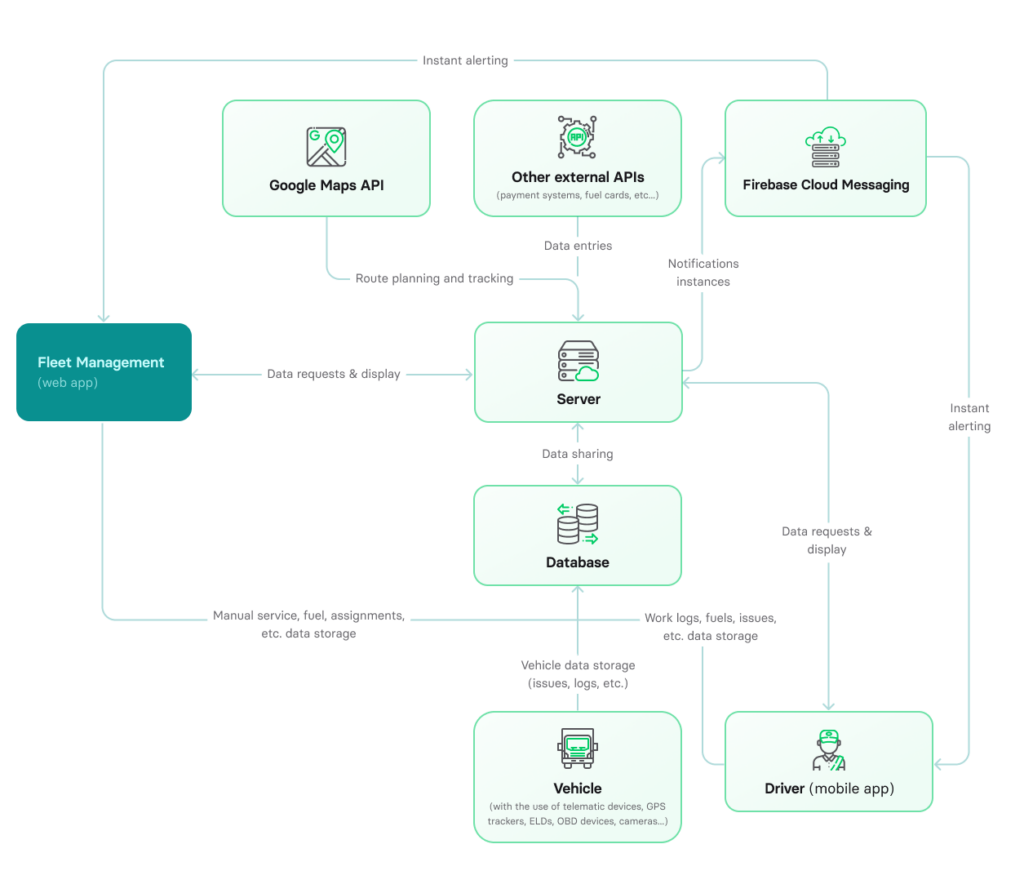
Custom fleet management software solutions can be used by a wide range of organizations, including logistics companies, government agencies, transportation companies, and even small businesses with a few vehicles.
Fleet management market overview 2024 – 2028

Global Fleet Management Market – Industry Trends and Forecast to 2028
Fleet management is an essential aspect of many industries, including logistics, transportation, construction, and field services. The fleet management market is expected to reach a value of USD 57.94 billion by 2028, at a compound annual growth rate of 19.45% over the forecast period (2021–2028).
The growth is driven by increasing demand for fleet management service providers, government regulations mandating the use of such systems, and the need to enhance operational efficiency.
The market comprises various fleet management software providers, telematics companies, and OEMs (original equipment manufacturers) such as Ford, General Motors, and Toyota, among others. The key players in the market include Trimble, Verizon, Geotab, Omnitracs, and Donlen, among others.
The market is highly competitive, with several players offering a range of solutions. They include vehicle tracking, driver behavior monitoring, fuel management, route planning, and maintenance management.
The increasing use of advanced technologies such as IoT, artificial intelligence, and machine learning is expected to fuel the growth of the fleet management market in the coming years. Such technologies provide more sophisticated solutions to optimize fleet performance and enhance customer service.
To learn more about the current state of fleet management technology and its impact across various sectors, explore our comprehensive industry research report. Our research, enriched with perspectives from 13 top industry players, provides not merely data but an in-depth analysis of the current landscape of the fleet management sector.
Challenges that fleet business owners face
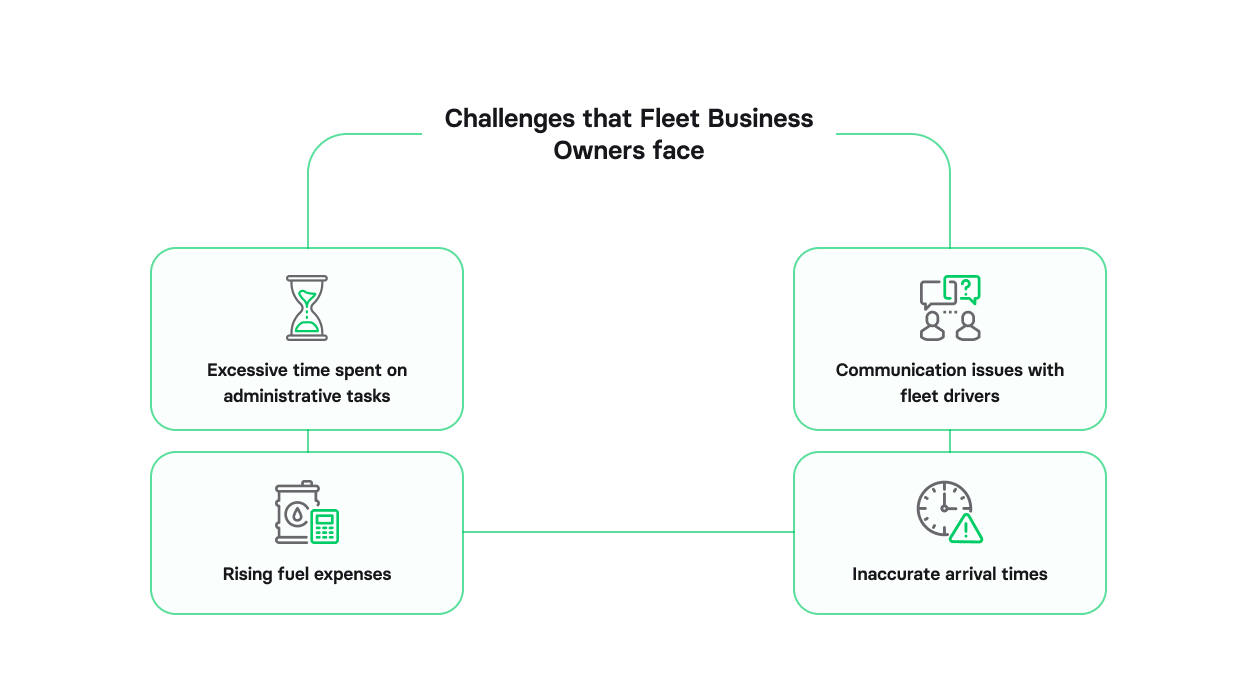
Managing a fleet of vehicles presents various challenges for business owners. And fleet management apps offer a comprehensive solution to address these challenges.
Challenge 1: Excessive time spent on administrative tasks
Fleet business owners spend a lot of time on scheduling, dispatching, billing, and paperwork. These tasks can be time-consuming and can divert their attention from more crucial tasks.
Solution: Fleet management apps automate scheduling, dispatching, billing, and paperwork, significantly reducing the time and effort required for these administrative tasks. This allows business owners to focus their attention on more crucial aspects of fleet management.
Challenge 2: Rising fuel expenses
Fuel is one of the most significant expenses for fleet businesses. Fluctuating fuel prices can significantly impact the bottom line. Finding ways to optimize fuel efficiency is critical for cost savings.
Solution: Fleet management apps provide tools for monitoring and optimizing fuel consumption, helping businesses mitigate the impact of fluctuating fuel prices and improve overall cost savings.
Challenge 3: Communication issues with fleet drivers
Miscommunication can result in delayed or missed deliveries, inaccurate tracking, and increased costs.
Solution: Fleet management apps facilitate effective communication with fleet drivers through messaging and tracking features, reducing the chances of miscommunication and ensuring smoother operations.
Challenge 4: Inaccurate arrival times
Accurate arrival times are crucial for fleet businesses, especially for time-sensitive deliveries. It can lead to delays, unhappy customers, and loss of business. Fleet management solutions can assist in route optimization, enabling fleet management companies to enhance their operations.
Solution: Fleet management apps offer real-time tracking and route optimization features, enabling businesses to provide accurate arrival times for deliveries, thereby enhancing customer satisfaction and preventing costly delays.
Benefits of fleet management software
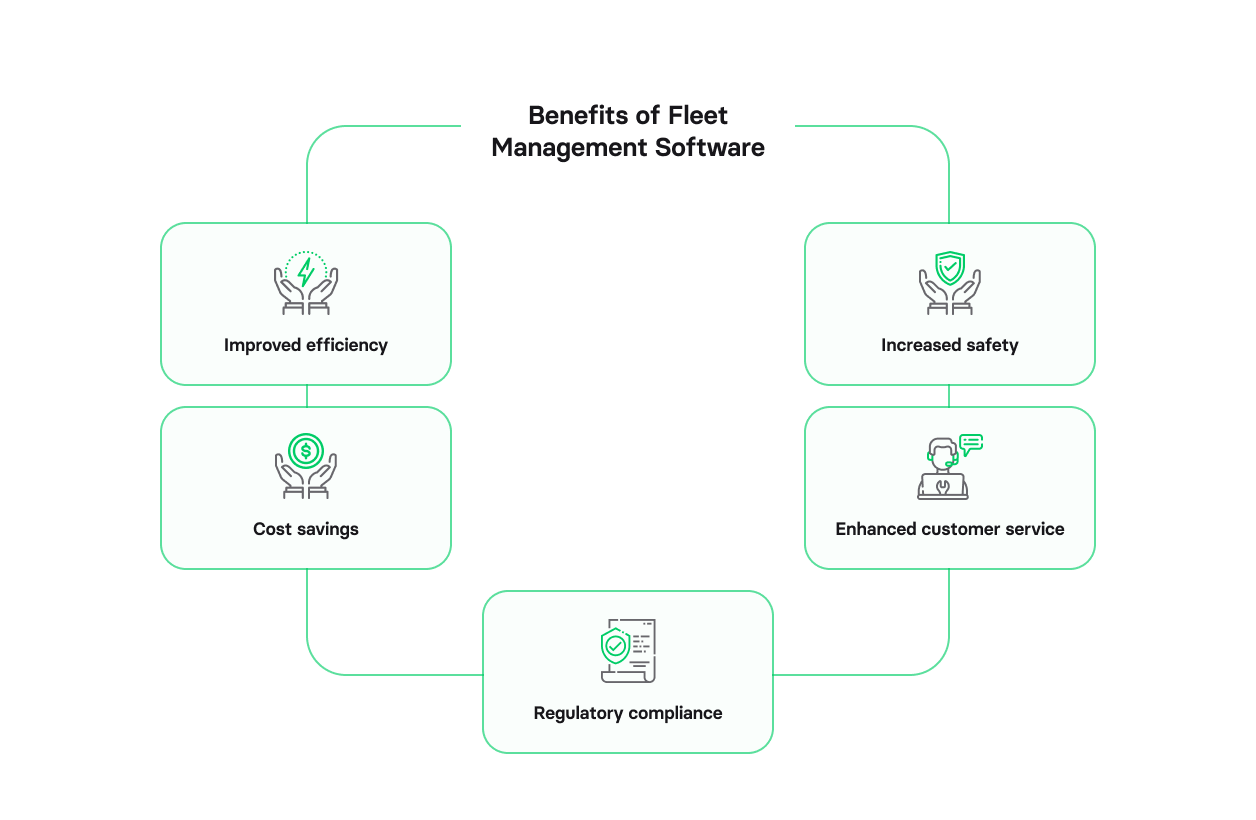
Businesses can reap numerous benefits from implementing a fleet management system, including:
Improved efficiency
You can streamline your vehicle operations by automating various tasks such as scheduling, dispatching, and vehicle utilization.
Cost savings
With real-time tracking of vehicles, you can closely monitor fuel usage, decrease maintenance expenditures, and boost the use of your assets.
Increased safety
This system equips you with the necessary tools to adhere to safety regulations and fosters the adoption of safe driving practices.
Enhanced customer service
It provides real-time information on delivery status, enabling businesses to provide customers with accurate arrival times and improve overall customer satisfaction.
Regulatory compliance
Businesses can maintain regulatory compliance and evade expensive penalties with the aid of tools that monitor maintenance, inspections, and other regulatory mandates.
Fleet management software can significantly enhance your fleet management workflow and help refine your fleet operations.
7 most popular fleet management software features
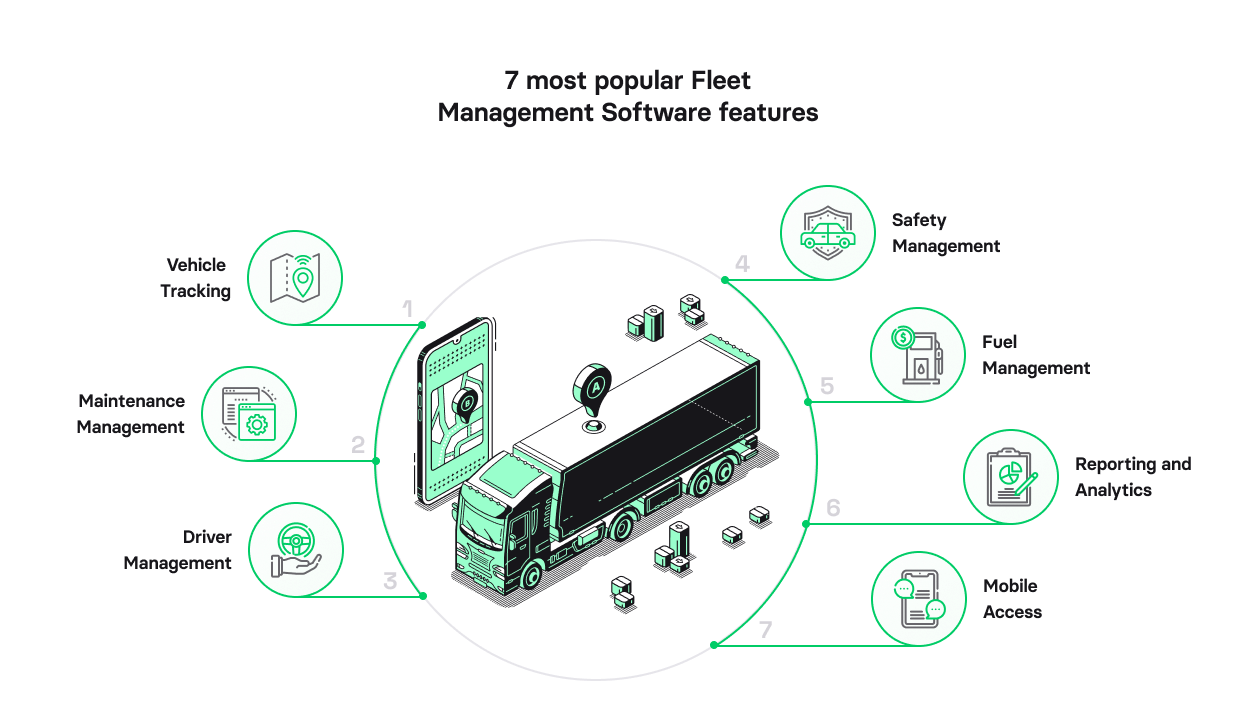
Fleet management software solutions are designed to help organizations manage their vehicles, drivers, and operations. The key features of fleet management systems can vary depending on the specific needs of the company. However, here are some of the most common features:
Feature 1: Vehicle tracking
GPS fleet tracking technology allows the fleet manager to track the location, speed, and direction of their vehicles in real time. This helps managers to optimize routes, and reduce the consumption of fuel. By analyzing real-time data from GPS fleet tracking, fleet managers can make informed decisions on route adjustments and driver behavior.
Feature 2: Maintenance management
Fleet maintenance software can help managers schedule regular maintenance, track service records, and receive alerts when vehicles need maintenance. This ensures that vehicles stay in good condition and reduces the risk of breakdowns. By proactively addressing maintenance needs, fleet management software contributes to improved vehicle longevity and minimizes unexpected downtime, thereby maximizing operational efficiency.
Feature 3: Driver management
Vehicle management systems can track driver behavior, including speed, and braking patterns. This allows managers to identify areas for improvement and provide feedback to drivers. By pinpointing areas for improvement and offering constructive feedback to drivers, vehicle management systems play a pivotal role in improving driver behavior and safety within fleets.
Feature 4: Safety management
Such systems can provide alerts for unsafe driving practices. You can track metrics such as speed, harsh braking, and acceleration, and provide real-time feedback to drivers. By monitoring these metrics closely and delivering real-time feedback to drivers, fleet management systems contribute to improved safety and encourage safer driving practices within the organization.
Feature 5: Fuel management
A fleet management system can track fuel consumption and help with route optimization. This can help organizations save money and reduce their carbon footprint. By optimizing routes and reducing fuel consumption, fleet management systems not only contribute to cost savings but also align with environmentally responsible practices, ultimately reducing the organization’s carbon footprint.
Feature 6: Reporting and analytics
A fleet management solution can generate detailed reports and analytics on various aspects of fleet operations. This helps managers to identify trends, track performance, and make data-driven decisions. Furthermore, these reports and analytics can provide valuable insights into areas requiring optimization, cost-saving opportunities, enhanced safety measures, and help to implement a driver reward program to boost your team’s motivation.
Feature 7: Mobile access
This feature enables fleet managers and supervisors to access real-time data and key information about their fleet, drivers, and operations while on the go. Mobile access allows for better decision-making and responsiveness, as managers can monitor and control fleet activities from anywhere. Mobile apps in fleet management are instrumental in providing real-time data analytics and enabling seamless communication between managers and drivers.
Overall, these functions are basic to many fleet management systems, but there may be additional features that may be useful for your business, for example, geofencing that enables the establishment of virtual geographic boundaries for specific areas or routes. When a vehicle equipped with the system enters or exits these predefined zones, the software can trigger automated notifications or actions. Geofencing use cases span a wide range of industries, extending beyond marketing and advertising to encompass sectors like logistics, security, agriculture, and numerous other fields.
If you have a particular feature or requirement in mind, don’t hesitate to reach out to us via info@volpis.com. Our experts would be happy to answer any questions you might have.
What devices are used in fleet management systems?
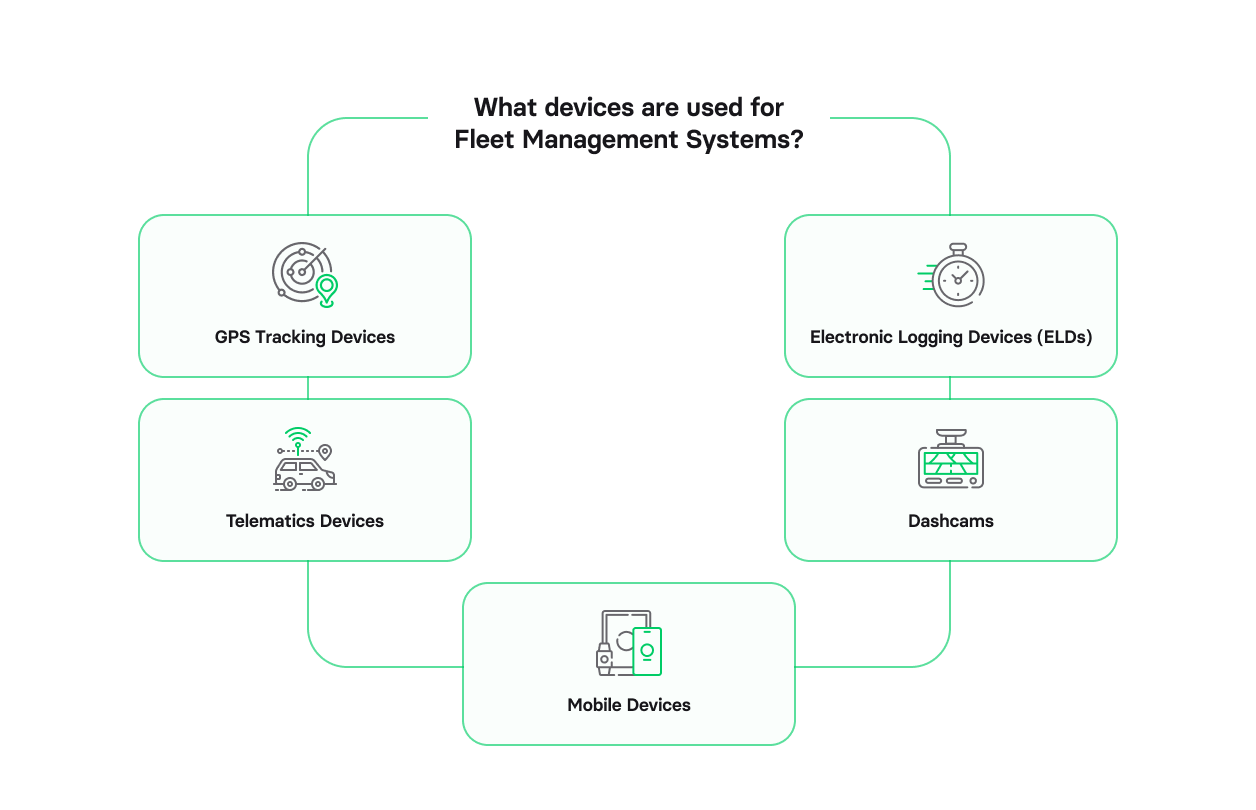
Fleet management systems are designed to help organizations manage their vehicles, drivers, and operations. To do this, these systems use a combination of hardware and software solutions. Here are some of the devices that are commonly used for fleet management:
GPS tracking devices
These devices are a key component of fleet management systems, allowing fleet managers to track the location, speed, and direction of their vehicles in real time. These devices use satellite signals to determine the location of the vehicle and transmit this information to the software. This real-time tracking information is invaluable for optimizing routes, reducing fuel consumption, and enhancing overall fleet efficiency.
Telematics devices
These devices are installed in vehicles to collect and transmit data on a wide range of vehicle metrics, including fuel consumption and engine performance. Telematics devices play a pivotal role in fleet management, offering real-time insights into vehicle metrics that empower managers to make data-driven decisions, reduce operational costs, and enhance overall fleet efficiency.
Electronic logging devices (ELDs)
ELDs are devices that are used to track a driver’s hours of service, ensuring that they comply with federal regulations. These devices are connected to the vehicle’s engine and can automatically record hours of service, duty status, and driving behavior. ELDs not only help monitor compliance with federal regulations but also provide valuable data on driver performance and duty status, contributing to safer and more efficient fleet operations.
Dashcams
Dashcams are small cameras mounted on a vehicle’s dashboard or windshield. These cameras can record video footage of the road ahead, which can be used to provide evidence in the event of an accident. Dashcams are becoming increasingly popular in fleet management as they offer a valuable tool for monitoring driver behavior and assessing road conditions, enhancing safety and accountability within a fleet.
Mobile devices
Many fleet management systems offer mobile apps that allow managers to access real-time location data and communicate with drivers. These apps can be installed on smartphones or tablets and provide a convenient way to stay connected to the fleet. One example is Fleetsu, a fleet management application that provides a convenient way for users to manage their fleets.
Future of fleet management software systems
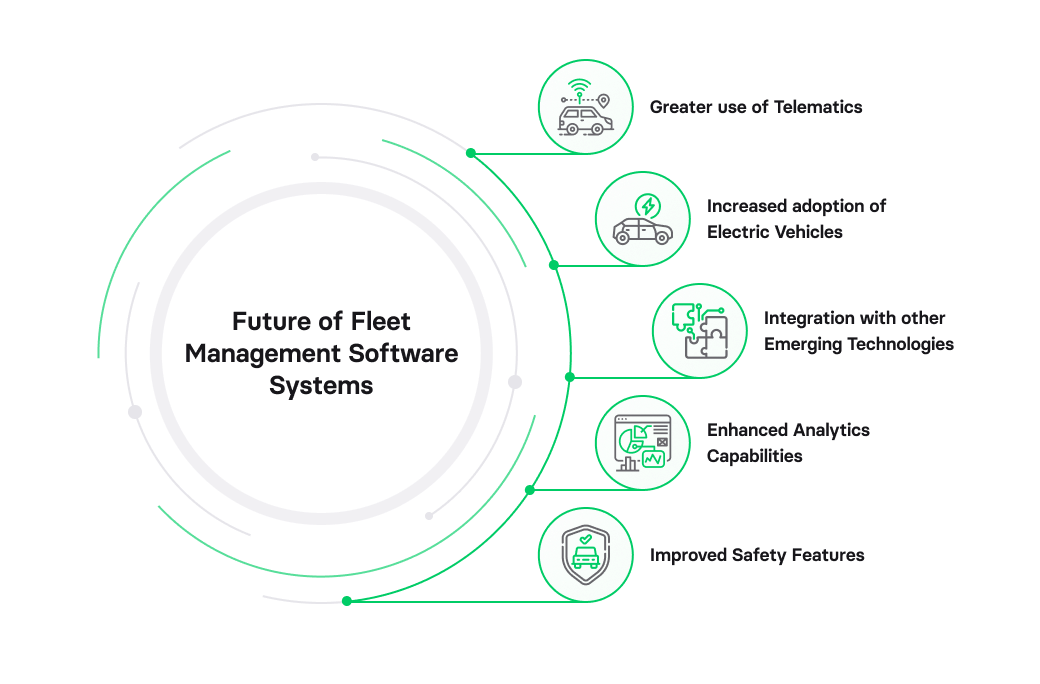
With new developments in telematics, electric vehicles, artificial intelligence (AI), and other emerging technologies, fleet managers have an ever-expanding array of tools to optimize fleet performance, reduce costs, and enhance safety. These fleet management trends highlight the ongoing evolution of the industry, offering exciting opportunities for businesses to stay competitive and environmentally responsible while efficiently managing their fleets.
As technology continues to advance, the future of fleet management software looks bright. Here are some possible ways that fleet management systems may evolve in the coming years:
Greater use of telematics
Telematics technology enables remote monitoring of vehicle data, such as location, speed, and engine health. In the future, more vehicle fleets may adopt telematics to provide real-time insights into vehicle performance, helping fleet managers with route optimization.
Increased adoption of electric vehicles
As electric vehicle (EV) technology continues to advance and battery costs decrease, more fleets may adopt EVs. This could lead to greater demand for fleet management systems that can monitor and manage EV charging, battery health, and range.
Integration with other emerging technologies
Fleet management systems may integrate with other emerging technologies, such as autonomous vehicles, drones, and predictive maintenance and predictive charging systems. This could enable greater efficiency, safety, and cost savings in fleet operations.
Enhanced analytics capabilities
As fleet management systems collect more data, they may incorporate advanced analytics tools such as machine learning and AI. This could provide greater insights into fleet utilization and help fleet managers make more informed decisions.
Improved safety features
With advances in AI and other technologies, fleet management systems may be able to predict and prevent accidents, reducing the risk of injuries and fatalities.
Overall, the future of fleet management systems looks promising, with continued advancements in technology providing opportunities for greater safety and cost savings. Attending fleet management conferences can offer valuable firsthand insights into the latest technological advancements, ensuring that businesses remain well-informed and prepared to leverage these innovations for optimal fleet performance.
Best fleet management software solutions
There are several successful fleet management solutions available in the fleet management software market today, including:
Fleetio
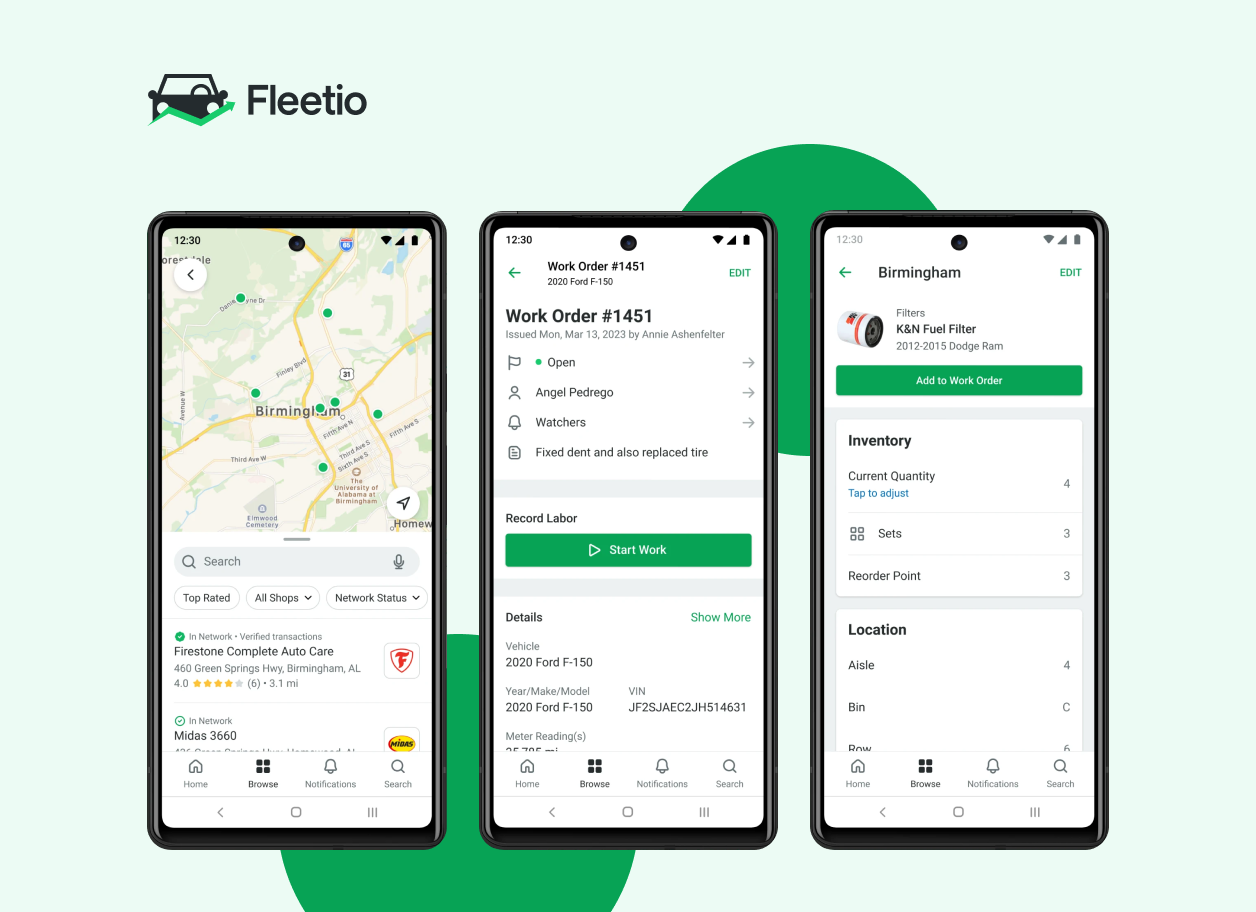
Fleetio is a cloud-based software that provides businesses with tools for managing vehicles, maintenance, fuel consumption tracking, and more. It offers real-time fleet tracking, automated maintenance schedules, and customizable reports. This app allows businesses to streamline their operations and increase fleet efficiency.
Onfleet
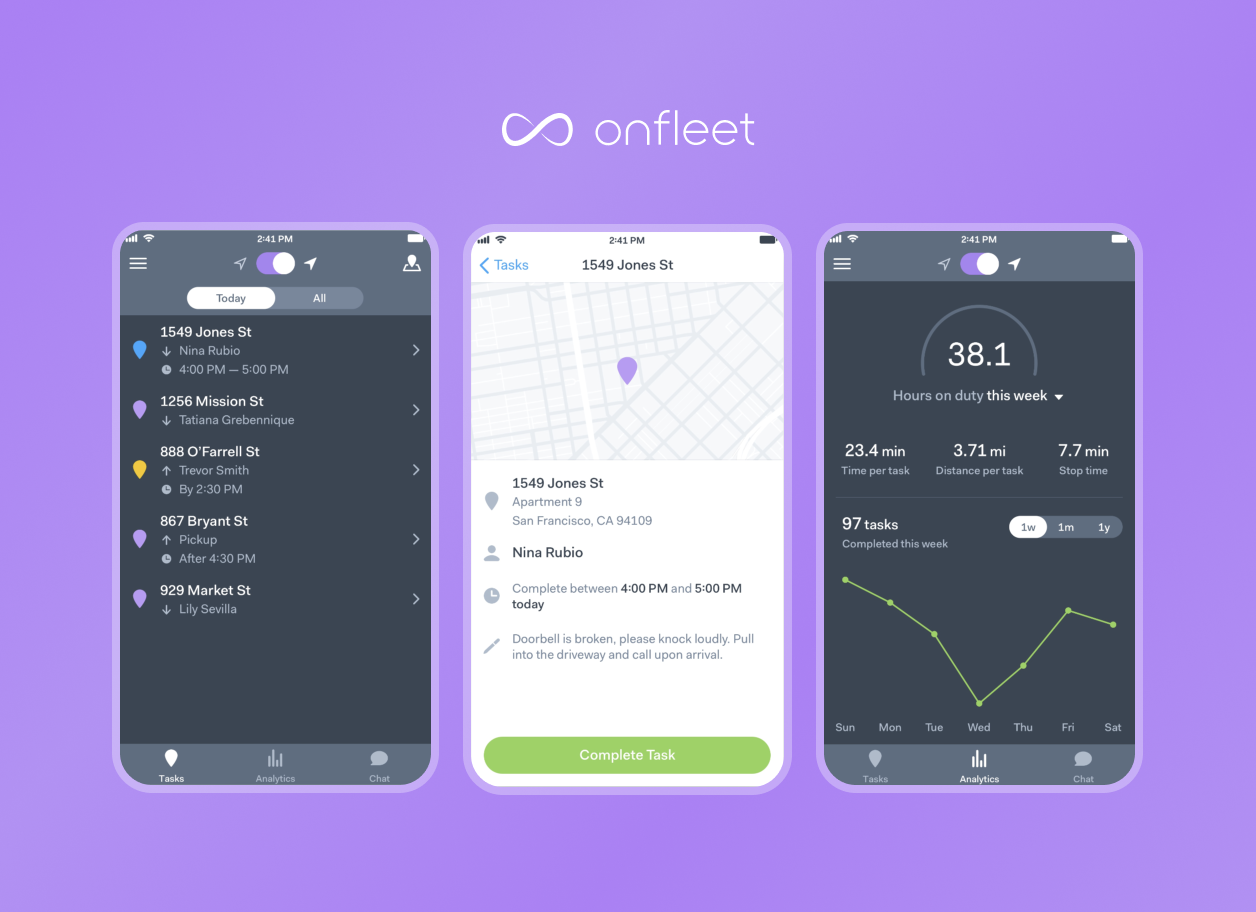
Onfleet is a delivery management software that helps businesses optimize their last-mile delivery operations. It offers features such as real-time tracking, driver dispatching, and customer notifications. This app helps to improve customer service and delivery efficiency.
Fleetsu
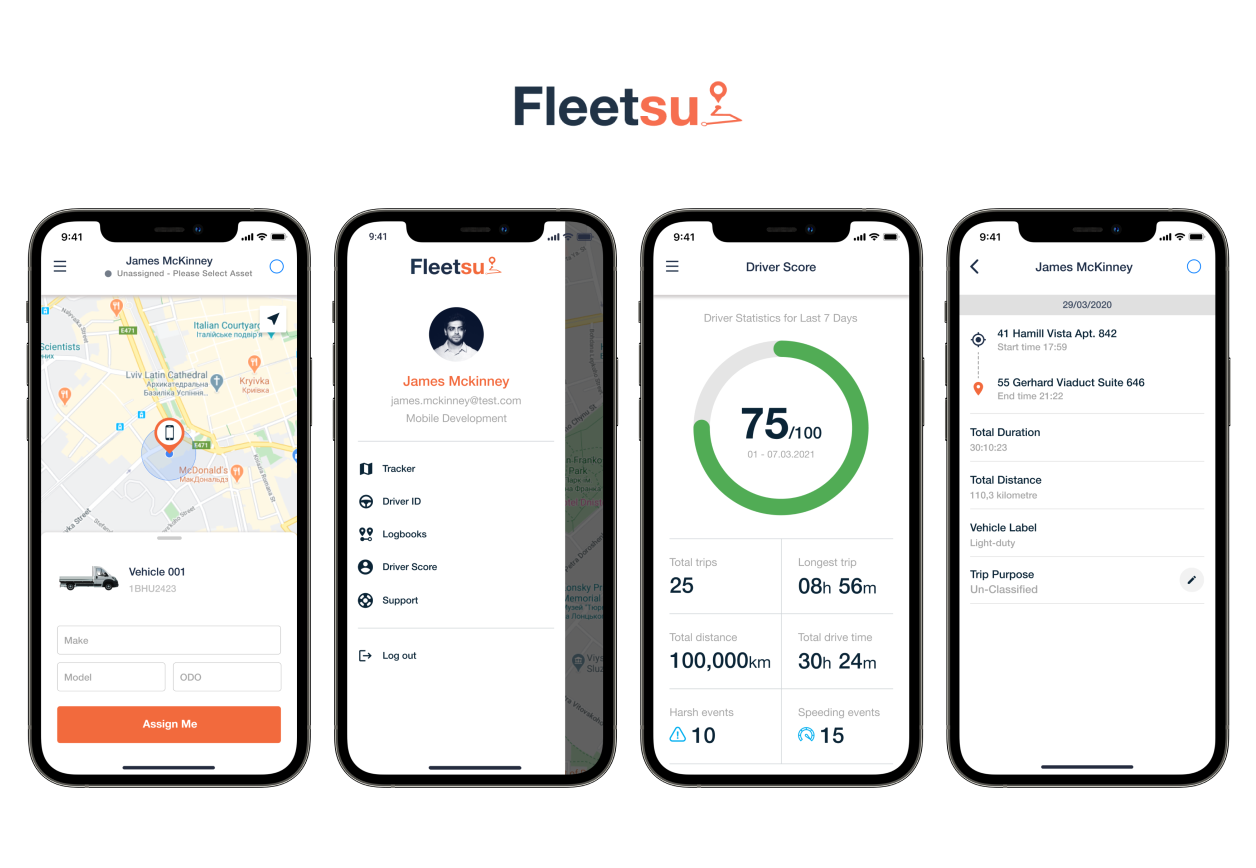
Fleetsu is a custom fleet management app developed by Volpis. It provides businesses with real-time GPS vehicle tracking, vehicle diagnostics, driver behavior monitoring, and more. Fleetsu offers an intuitive user interface and customizable dashboards, allowing managers to monitor their fleet and make informed decisions.
If you are looking to develop your own fleet management tool or need help with an existing project, contact us for a consultation.
Most common problems in fleet management systems
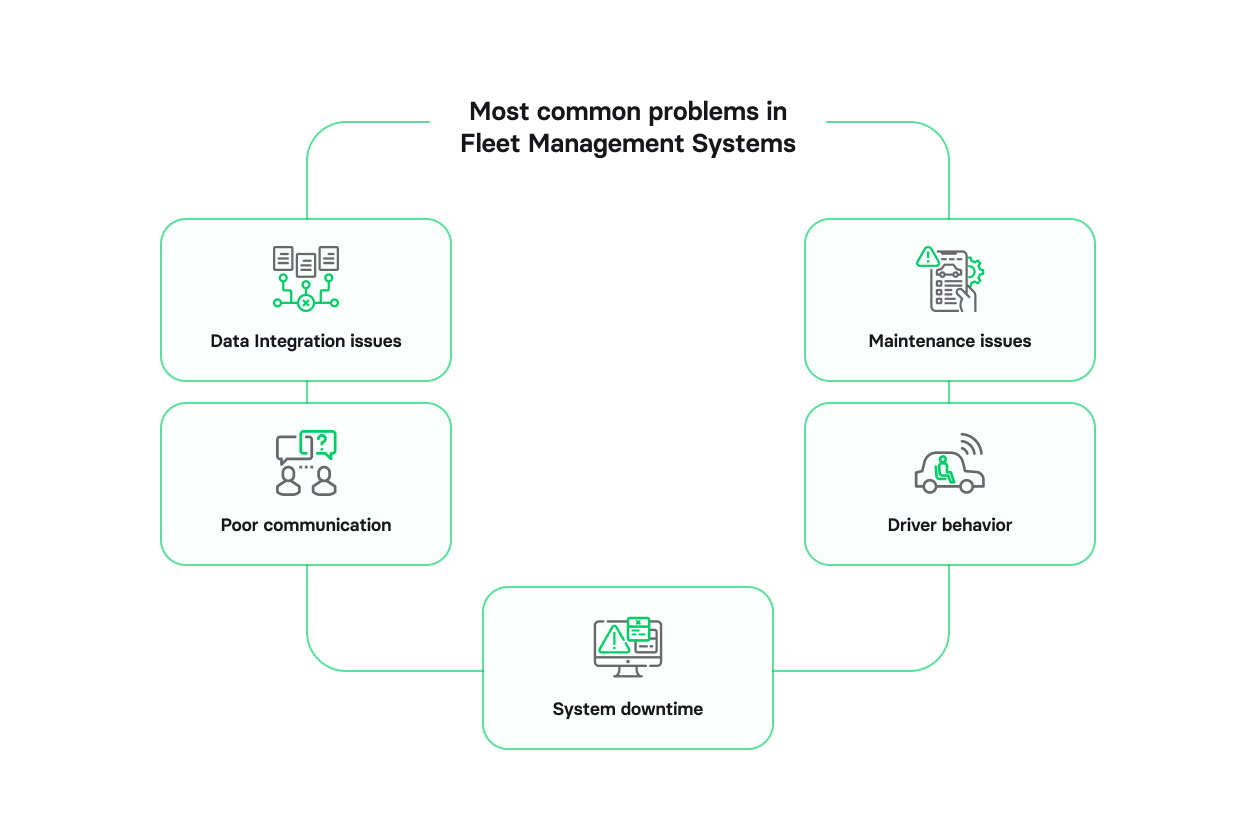
Problem 1: Data integration issues
One of the main challenges of fleet tracking software is integrating data from different sources, such as GPS devices, telematics systems, and driver logs. If these systems are not properly integrated, it can result in inaccurate or incomplete data that can undermine the effectiveness of the system.
Problem 2: Poor communication
Fleet management systems rely on communication between drivers, dispatchers, and managers. If there is poor communication, it can result in missed pickups or deliveries, delays, and other problems that can impact the efficiency of the fleet.
Problem 3: Maintenance issues
Maintenance is a critical part of fleet management, and failing to properly maintain vehicles can result in breakdowns, increased fuel consumption, and other issues. Fleet management systems can help schedule maintenance, but if this process is not properly managed, it can lead to maintenance backlogs and vehicle downtime.
Problem 4: Driver behavior
Issues such as speeding, hard braking, and idling can increase fuel costs, maintenance costs, and the risk of accidents. By utilizing advanced telematics technology, fleet management systems can provide real-time feedback to drivers on their behavior, allowing them to make necessary adjustments.
Problem 5: System downtime
Like any system, fleet management systems can experience downtime due to hardware or software issues, network outages, or other problems. If the system is down, it can result in missed pickups or deliveries, lost productivity, and other issues that can impact the efficiency of the fleet.
Overall, fleet management systems can be effective tools for optimizing fleet operations, but they require proper planning, implementation, and management to ensure that they work effectively. By addressing these common problems, fleet managers can ensure that their systems operate efficiently.
Fleet management software development: a step-by-step guide
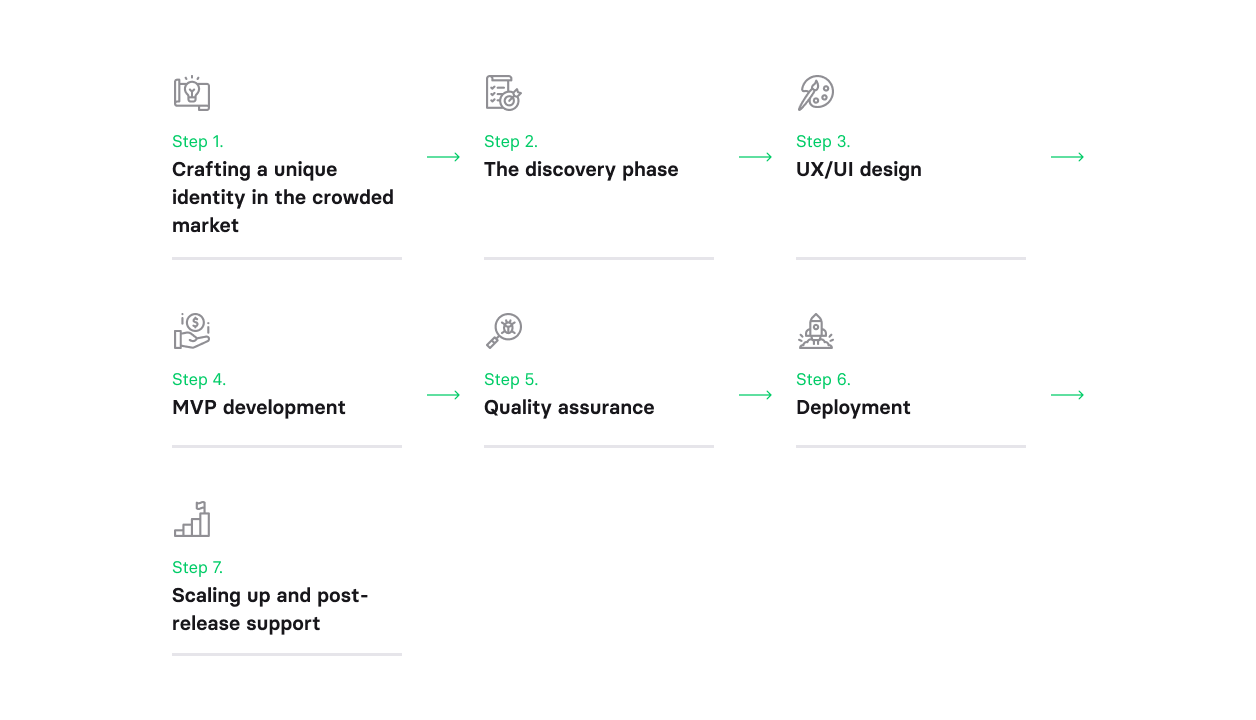
Developing fleet management software requires a thorough understanding of the industry’s unique challenges. The process consists of several crucial steps that require meticulous planning.
Step 1: Crafting a unique identity in the crowded market
Before diving into the development, it’s crucial to identify what sets your fleet management software apart in the crowded market. Your software development company should conduct an analysis of current solutions to identify their limitations, and then proceed to create innovative functionalities that specifically address the needs of your target users. Ensure that your software stands out by offering innovative functionalities and addressing industry-specific challenges.
Step 2: The discovery phase
The primary objective of the discovery phase is to gather all necessary information about the project. The outcome of the discovery phase is a detailed project plan that includes a roadmap for the development process, requirements documentation, and a list of the most appropriate technologies to achieve optimal results. This stage comprises several essential sub-steps:
- Analysis: conduct an in-depth analysis of your target audience, competitors, and market needs to identify the features that will make your software stand out.
- Identification: determine the challenges faced by the fleet management industry and prioritize the fleet management software features that address these issues.
- Wireframing: create a visual representation of your software’s layout, user interface, and flow, allowing for necessary adjustments before development begins.
- Technical Analysis: based on specific needs, select the most appropriate technologies, map and routing providers, and geocoding services to ensure functionality, efficiency, and cost-effectiveness.
Step 3: UX/UI design
With a clear understanding of your software’s unique features and target audience, you can move to UX/UI design. The user experience (UX) and user interface (UI) design play pivotal roles in determining the software’s effectiveness and user adoption. Check this guide for more insights on optimizing the user experience design of fleet management apps, ensuring that your software not only meets functional needs but also delivers a user-friendly interface.
Step 4: MVP development
The minimum viable product (MVP) version of your software should include the core functionality of your software, serving as a basic yet functional version for testing and refinement.
Step 5: Quality assurance
Thorough quality assurance (QA) testing is essential to ensure proper functionality, security, and compliance. This includes testing features, fixing bugs, and gathering user feedback. A rigorous QA process guarantees high-quality software ready for release.
Step 6: Deployment
The deployment stage signifies the software’s launch. This process involves preparing the software for release, submitting it to various platforms, and configuring it for distribution.
Step 7: Scaling up and post-release support
Once the software is accessible to users, the development team concentrates on enhancing functionality, adding new fleet management software features, and expanding the user base. They also provide post-release support to address any user concerns or issues.
We would be delighted to offer a free consultation to answer all your questions and address any inquiries you may have regarding the custom fleet management software development process.
How to implement AI and ML into your fleet management software system
Integrating Artificial Intelligence (AI) and Machine Learning (ML) into your fleet management software system can revolutionize the way you oversee your vehicle fleet. These technologies can offer sophisticated capabilities that enhance decision-making, optimize operations, and reduce costs. Let’s explore how AI and ML can be leveraged effectively within a fleet management software system.
1. Predictive maintenance
- AI/ML application: Predict when vehicles and equipment will require maintenance or repairs based on historical data and real-time sensor inputs.
- Example: Analyze engine performance data to identify patterns indicating potential issues, enabling proactive predictive fleet maintenance and reducing downtime.
2. Route optimization
- AI/ML application: Optimize delivery routes in real time by considering factors like traffic, weather, and delivery schedules.
- Example: Utilize AI algorithms to adjust routes dynamically, ensuring efficient use of fuel and timely deliveries.
3. Driver behavior analysis
- AI/ML application: Monitor driver behavior to identify unsafe actions, such as speeding or harsh braking, and provide real-time feedback.
- Example: Implement AI-driven driver monitoring systems that analyze data from onboard cameras and sensors to improve safety.
4. Fuel efficiency enhancement
- AI/ML application: Analyze data on driver behavior, vehicle performance, and road conditions to optimize fuel consumption.
- Example: ML models can recommend fuel-efficient driving habits and vehicle maintenance schedules, resulting in significant cost savings.
5. Real-time data insights
- AI/ML application: Process and analyze vast amounts of data in real time to provide actionable insights for informed decision-making.
- Example: Use AI to monitor vehicle locations, fuel levels, and weather conditions to reroute vehicles during unexpected road closures or weather events.
6. Inventory management
- AI/ML application: Predict inventory needs based on historical demand patterns and adjust supply chain logistics accordingly.
- Example: AI algorithms can forecast the demand for specific vehicle parts, ensuring efficient stock levels and reducing inventory costs.
7. Safety and compliance
- AI/ML application: Ensure compliance with safety regulations by continuously monitoring driver behavior and vehicle conditions.
- Example: Implement AI-driven dashcams that detect driver fatigue or distraction, alerting both the driver and the fleet manager.
8. Data analytics for cost reduction
- AI/ML application: Analyze data to identify areas for cost reduction, such as optimizing fuel usage, reducing idle time, and minimizing vehicle wear and tear.
- Example: ML-powered analytics tools can uncover hidden cost-saving opportunities, such as suggesting optimal maintenance intervals or identifying underutilized vehicles.
AI and ML can analyze complex data, adapt to changing conditions, and provide actionable insights, ultimately helping you achieve more efficient and cost-effective fleet management. Please check out our comprehensive guide for more insights on harnessing the power of AI and ML in fleet management,
Custom fleet management software pricing
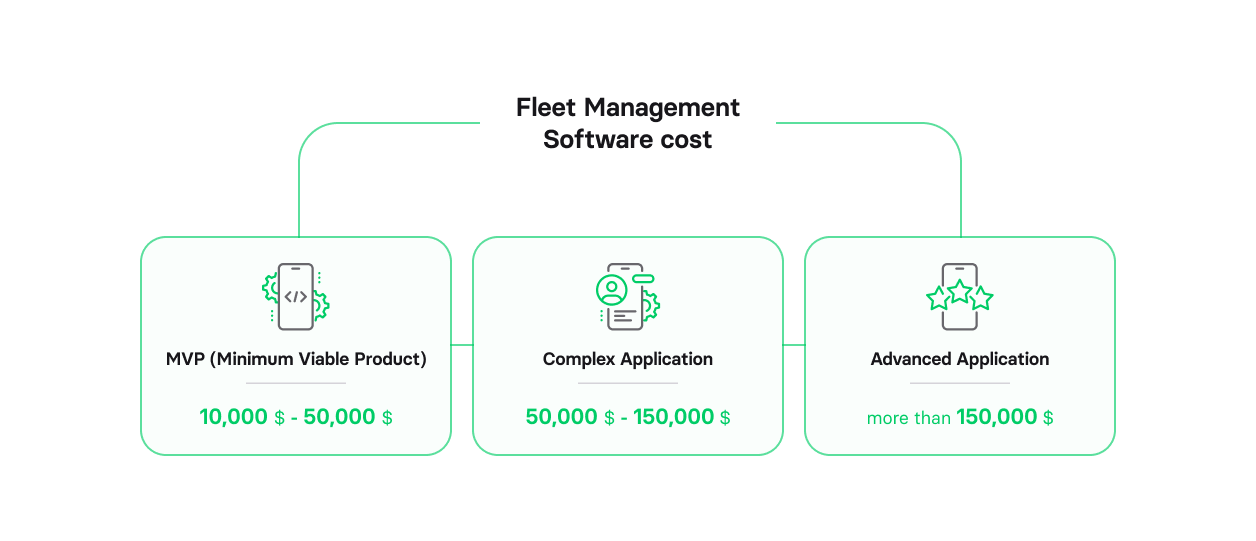
The cost of fleet management software can vary depending on the features and complexity of the application. Here are some rough estimates based on typical development costs:
- MVP (Minimum Viable Product): A basic fleet management app with limited features can cost anywhere from 10,000 USD to 50,000 USD.
- Complex application: A more comprehensive fleet management app with advanced features, such as predictive maintenance, advanced analytics, or customized integrations, can cost between 50,000 USD to 150,000 USD.
- Advanced application: A highly sophisticated fleet management application that includes features such as AI-driven predictive maintenance, real-time analytics, and advanced reporting can cost more than 150,000 USD.
However, it’s important to keep in mind that these are rough estimates, and the actual cost can vary significantly based on the specific needs and requirements of the business.
To keep the cost under control, one effective approach is to launch a Minimum Viable Product with only the essential functions. After testing and receiving feedback, you can determine which functions and tools should be added to the app. This approach can help reduce the overall cost while providing an opportunity to make informed decisions based on feedback from actual users.
What to choose: use off-the-shelf software or develop your own fleet management system
Deciding whether to develop your own fleet tracking software or use an existing one is a strategic decision that depends on various factors such as budget, timeline, resources, and specific business requirements.
Option 1: Using an off-the-shelf software solution
Adopting a standardized fleet management system can save you time, as well as provide you with proven functionality. It also allows you to benefit from ongoing updates and support from the system provider. However, it may not fully align with your specific business requirements, and you may have to compromise on some features.
Moreover, some off-the-shelf fleet management systems may not integrate with your existing business systems, which can result in data silos and additional manual work. It’s crucial to consider the compatibility and integration capabilities of any software solution you choose.
Option 2: Custom fleet management software development
Developing your own system gives you complete control over the features, allowing you to tailor the system to your specific needs. However, it requires a considerable amount of time, effort, and resources.
Your own fleet management system can also have the potential to become a marketable product and generate revenue for your business. By creating a system that meets the specific needs of your organization, you may be able to offer it to other businesses in the same industry. However, it’s important to keep in mind that creating a marketable product requires additional effort and investment, including marketing and sales strategies, and ongoing product development and support to meet customer needs and preferences.
Ultimately, the decision should be based on a careful analysis of the business needs, budget, timeline, and available resources. It may also be beneficial to consult with a reputable fleet management service provider or software development firm to help assess the options and make an informed decision.
How Volpis can bring your software vision to life
Volpis is a software development company that specializes in developing custom fleet management software solutions for businesses. Regularly ranked among the Top Custom Software Development Companies on Clutch, Volpis has been leveraging the power of technology to assist business owners in reaching unparalleled milestones. Our commitment to excellence is reflected in the glowing reviews from our customers, who consistently praise our dedication to delivering exceptional results.
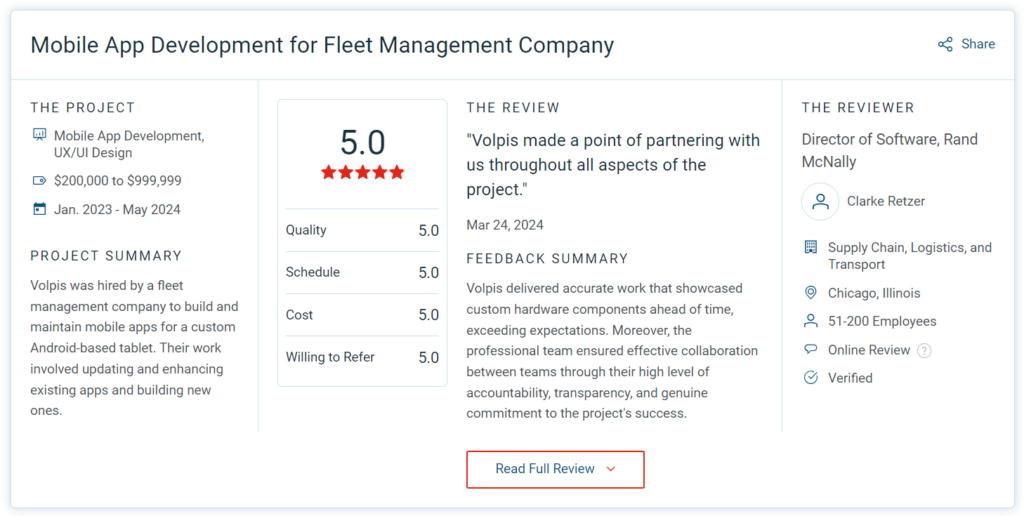
Read more reviews from our valuable customers here
Our team, consisting of over 40 in-house experts, brings extensive experience and creativity to each project. We invite you to explore our portfolio for a detailed look at the software systems we have developed for our clients.
One example of our expertise is the development of Fleetsu, a software designed to help businesses optimize their fleet operations. The result was a highly efficient and effective solution that helped the client save time and money while improving their fleet performance.
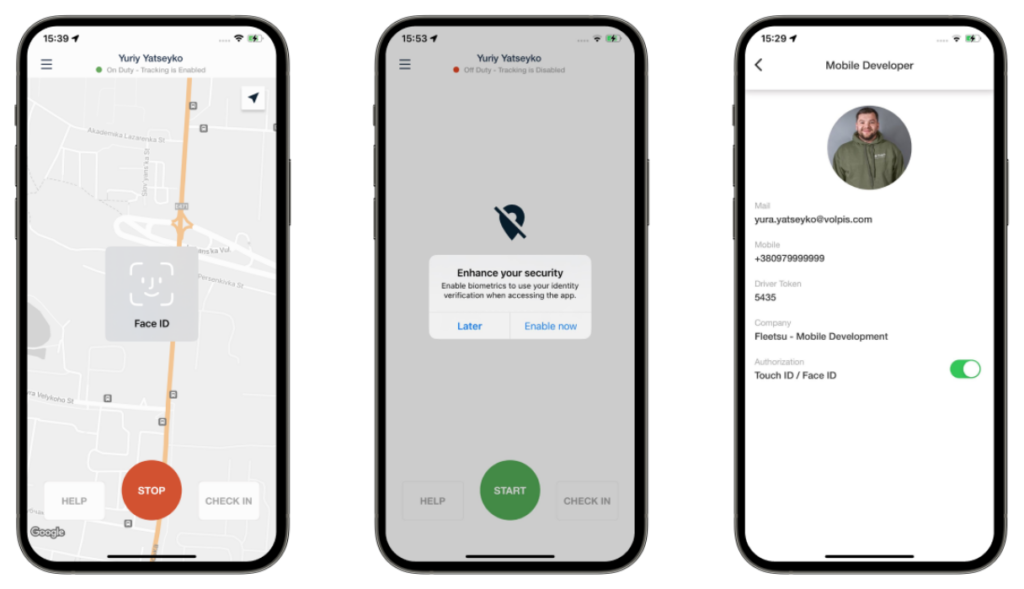
Another example is FleetSo, a web application that includes features such as real-time GPS tracking, automated dispatch, driver performance monitoring, and maintenance scheduling, among others.
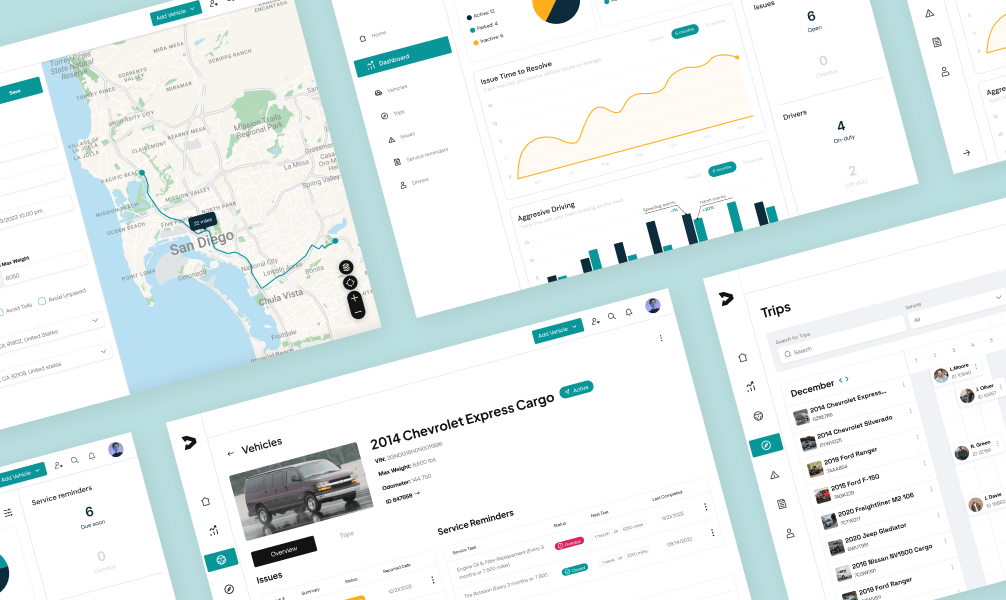
We’d love to answer any questions you may have. You can reach out to us via info@volpis.com with any questions or to explore how we can be part of your journey.
Questions & Answers
FAQ
How much does it typically cost to develop custom fleet management software, and what factors influence the cost?
Typically, the cost of developing custom fleet management software can range from $10,000 to $150,000 or more. A sophisticated system will require a more significant investment of time and resources. It’s important to have a clear understanding of the requirements and scope of the project to determine the cost accurately. If you have any questions about the costs involved, you can schedule a free consultation.
What post-release support and maintenance is required for fleet management software, and how can it be provided?
Post-release support and maintenance for fleet management software are crucial for ensuring the system runs smoothly and effectively. This may include fixing bugs, updating the system, providing technical support, and integrating new features. The level of support required will depend on the complexity of the system and the needs of the business. Ongoing support and maintenance can be provided through various options such as an in-house development team, outsourcing to a software development company, or engaging a dedicated support team.
What kind of ROI can I expect from fleet management software?
Businesses can typically expect to see cost savings through improved fuel efficiency, reduced maintenance costs, and increased productivity. The exact fleet management ROI will vary depending on factors such as the size of the fleet, the specific features and capabilities of the system, and the unique needs of the business.

Kostya Khuta, the CEO of Volpis, is an expert in crafting custom software solutions for the Fleet Management, Logistics, and Transportation industry. With over 8 years of experience, he leads the way in delivering innovative and tailored solutions to meet industry-specific needs.





